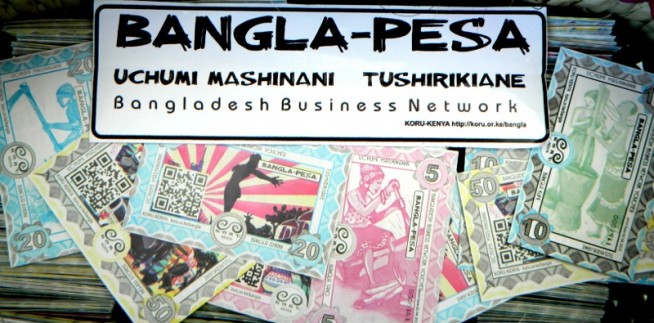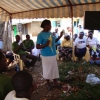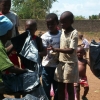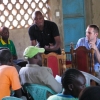Everyday, Burners Without Borders transforms communities through innovative disaster relief programs and community initiatives that make a lasting impact.
Community Currency Program
Location: Changamwe District, Kenya - Map It STATUS: Active
BWB’s Will Ruddick has been working in Kenya for several years to integrate alternative currencies into the lives of resource poor communities. BWB is proud to have supported Will’s work from the beginning when he created his first complementary currency project in Nairobi.
Currency Program Expands to Nairobi
After winning a precedent-setting case against the Central Bank, we re-launched the Bangla-Pesa currency in the largest informal settlement in Mombasa with great success and the full support of the government. Within months of launching the currency, sales revenue increased by at least $1 a day, enough to provide money for consistent meals or create savings to pay school fees for one child per family. Due to these successes, this program was recently named as one of Africa’s Top Innovations at the Summit Afrique in Paris. Most importantly, we have received unanimous requests from government representatives to replicate these programs to other areas in the county.
The Problem We’re Solving
Activists and development organizations are continually struggling for limited resources. But the current financial system not only doesn’t have the capacity to help, it is a fundamental part of the problem by creating dependency and increasing social stratification. We can change the development funding dynamic, by empowering communities to direct their own productive power to the will and needs of local people through complementary currencies. And, pertinent to the unstable monetary system we live in now, complementary currencies allow communities to provide services to each other that will not be affected by volatility in national currencies.
How Does it Work?
Will and his crew at Koru-Kenya have just produced a short, animated video that explains how it works.Check it out here.
Complementary Currencies (CCs) bring a radical change to how we think about local development and funding. Complementary Currencies as a Socio-Economic Development Module offer an innovative way to improve conditions by:
- Connecting communities to their own abundance.
- Providing community groups access to savings and credit without expensive banking fees.
- Providing a mechanism for communities to finance social services.
- Increasing local trade and business development.
- Decreasing corruption associated with aid funding.
Credit Clearing System
Each business registered in the network is allocated a credit line among the other businesses. This credit line is realized by being issued Banglas (Vouchers). The businesses also pay a membership fee to the network which is for administration, marketing and community programs. By using the Banglas to buy goods and services at fellow BBN member businesses, they also accept to sell their own goods and services for Banglas. The amount of Bangla-Pesa in circulation is determined by the membership and targeted at an amount usable for daily transactions. This currency forms a buffer against fluctuations in the money supply due to remittances, weather, holidays, sending children to school, political turmoil and so on.
Membership
The BBN membership consists of 90% women businesses owners who make on average ~2 Euros per day and support families by themselves. Generally they work several jobs and find no way to save money from month to month. They are also often sending any spare money back to extended family living in rural areas. The Bangla-Pesa gives them a way to save their national currency and use the local currency for daily spending. Businesses include services such as clothes washing, tailoring, manual laborer, house builders, salons, mechanical and electronic repairs, and porting. Other businesses include: Water, transportation, hardware, soap, general shops, food services, raw food (Including fish, meat, eggs, vegetables, fruits and grains), farming, charcoal, lamp oil, education (Primary and nursery school), clothes, medical clinics, drinks (including alcohol, soda and fruit drinks).



